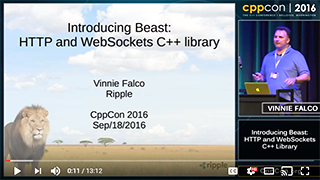HTTP and WebSocket built on Boost.Asio in C++11
| Branch | Linux / Windows | Coverage | Documentation | Matrix |
|---|---|---|---|---|
| master |  |
 |
 |
|
| develop |  |
 |
 |
Contents
- Introduction
- Appearances
- Description
- Requirements
- Git Branches
- Building
- Usage
- License
- Contact
- Contributing
Introduction
Beast is a C++ header-only library serving as a foundation for writing interoperable networking libraries by providing low-level HTTP/1, WebSocket, and networking protocol vocabulary types and algorithms using the consistent asynchronous model of Boost.Asio.
This library is designed for:
-
Symmetry: Algorithms are role-agnostic; build clients, servers, or both.
-
Ease of Use: Boost.Asio users will immediately understand Beast.
-
Flexibility: Users make the important decisions such as buffer or thread management.
-
Performance: Build applications handling thousands of connections or more.
-
Basis for Further Abstraction. Components are well-suited for building upon.
Appearances
| CppCon 2018 | Bishop Fox 2018 |
|---|---|
 |
 |
| CppCon 2017 | CppCast 2017 | CppCon 2016 |
|---|---|---|
 |
 |
Description
This software is in its first official release. Interfaces may change in response to user feedback. For recent changes see the CHANGELOG.
- Official Site
- Documentation (master branch)
- Autobahn|Testsuite WebSocket Results
Requirements
This library is for programmers familiar with Boost.Asio. Users who wish to use asynchronous interfaces should already know how to create concurrent network programs using callbacks or coroutines.
- C++11: Robust support for most language features.
- Boost: Boost.Asio and some other parts of Boost.
- OpenSSL: Required for using TLS/Secure sockets and examples/tests
When using Microsoft Visual C++, Visual Studio 2017 or later is required.
One of these components is required in order to build the tests and examples:
- Properly configured bjam/b2
- CMake 3.5.1 or later (Windows only)
Building
Beast is header-only. To use it just add the necessary #include line
to your source files, like this:
#include <boost/beast.hpp>If you use coroutines you'll need to link with the Boost.Coroutine library. Please visit the Boost documentation for instructions on how to do this for your particular build system.
GitHub
To use the latest official release of Beast, simply obtain the latest Boost distribution and follow the instructions for integrating it into your development environment. If you wish to build the examples and tests, or if you wish to preview upcoming changes and features, it is suggested to clone the "Boost superproject" and work with Beast "in-tree" (meaning, the libs/beast subdirectory of the superproject).
The official repository contains the following branches:
-
master This holds the most recent snapshot with code that is known to be stable.
-
develop This holds the most recent snapshot. It may contain unstable code.
Each of these branches requires a corresponding Boost branch and all of its subprojects. For example, if you wish to use the master branch version of Beast, you should clone the Boost superproject, switch to the master branch in the superproject and acquire all the Boost libraries corresponding to that branch including Beast.
To clone the superproject locally, and switch into the main project's directory use:
git clone --recursive https://github.com/boostorg/boost.git
cd boost
"bjam" is used to build Beast and the Boost libraries. On a non-Windows system use this command to build bjam:
./bootstrap.sh
From a Windows command line, build bjam using this command:
.\BOOTSTRAP.BAT
Building tests and examples
Building tests and examples requires OpenSSL installed. If OpenSSL is installed
in a non-system location, you will need to copy the
user-config.jam file into your home directory and set
the OPENSSL_ROOT environment variable to the path that contains an installation
of OpenSSL.
Ubuntu/Debian
If installed into a system directory, OpenSSL will be automatically found and used.
sudo apt install libssl-devWindows
Replace path in the following code snippets with the path you installed vcpkg
to. Examples assume a 32-bit build, if you build a 64-bit version replace
x32-windows with x64-windows in the path.
- Using vcpkg and CMD:
vcpkg install openssl --triplet x32-windows
SET OPENSSL_ROOT=path\installed\x32-windows- Using vcpkg and PowerShell:
vcpkg install openssl --triplet x32-windows
$env:OPENSSL_ROOT = "path\x32-windows"- Using vcpkg and bash:
vcpkg.exe install openssl --triplet x32-windows
export OPENSSL_ROOT=path/x32-windowsMac OS
Using brew:
brew install openssl
export OPENSSL_ROOT=$(brew --prefix openssl)
# install bjam tool user specific configuration file to read OPENSSL_ROOT
# see https://www.bfgroup.xyz/b2/manual/release/index.html
cp ./libs/beast/tools/user-config.jam $HOMEMake sure the bjam tool (also called "b2") is available in the path your shell uses to find executables. The Beast project is located in "libs/beast" relative to the directory containing the Boot superproject. To build the Beast tests, examples, and documentation use these commands:
export PATH=$PWD:$PATH
b2 -j2 libs/beast/test cxxstd=11 # bjam must be in your $PATH
b2 -j2 libs/beast/example cxxstd=11 # "-j2" means use two processors
b2 libs/beast/doc # Doxygen and Saxon are required for this
Additional instructions for configuring, using, and building libraries in superproject may be found in the Boost Wiki.
Visual Studio
CMake may be used to generate a very nice Visual Studio solution and a set of Visual Studio project files using these commands:
cd libs/beast
mkdir bin
cd bin
cmake .. # for 32-bit Windows builds, or
cmake -G"Visual Studio 15 2017 Win64" .. # for 64-bit Windows builds (VS2017)
The files in the repository are laid out thusly:
./
bin/ Create this to hold executables and project files
bin64/ Create this to hold 64-bit Windows executables and project files
doc/ Source code and scripts for the documentation
include/ Where the header files are located
example/ Self contained example programs
meta/ Metadata for Boost integration
test/ The unit tests for Beast
tools/ Scripts used for CI testing
Usage
These examples are complete, self-contained programs that you can build
and run yourself (they are in the example directory).
https://www.boost.org/doc/libs/develop/libs/beast/doc/html/beast/quick_start.html
License
Distributed under the Boost Software License, Version 1.0. (See accompanying file LICENSE_1_0.txt or copy at https://www.boost.org/LICENSE_1_0.txt)
Contact
Please report issues or questions here: https://github.com/boostorg/beast/issues
Contributing (We Need Your Help!)
If you would like to contribute to Beast and help us maintain high quality, consider performing code reviews on active pull requests. Any feedback from users and stakeholders, even simple questions about how things work or why they were done a certain way, carries value and can be used to improve the library. Code review provides these benefits:
- Identify bugs
- Documentation proof-reading
- Adjust interfaces to suit use-cases
- Simplify code
You can look through the Closed pull requests to get an idea of how reviews are performed. To give a code review just sign in with your GitHub account and then add comments to any open pull requests below, don't be shy!
https://github.com/boostorg/beast/pulls
Here are some resources to learn more about code reviews:
- Top 10 Pull Request Review Mistakes
- Best Kept Secrets of Peer Code Review (pdf)
- 11 Best Practices for Peer Code Review (pdf)
- Code Review Checklist – To Perform Effective Code Reviews
- Code review guidelines
- C++ Core Guidelines
- C++ Coding Standards (Sutter & Andrescu)
Beast thrives on code reviews and any sort of feedback from users and stakeholders about its interfaces. Even if you just have questions, asking them in the code review or in issues provides valuable information that can be used to improve the library - do not hesitate, no question is insignificant or unimportant!

